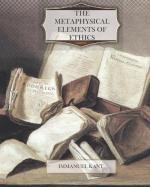B. Of conscience
Similarly, conscience is not a thing to be acquired, and it is not a duty to acquire it; but every man, as a moral being, has it originally within him. To be bound to have a conscience would be as much as to say to be under a duty to recognize duties. For conscience is practical reason which, in every case of law, holds before a man his duty for acquittal or condemnation; consequently it does not refer to an object, but only to the subject (affecting the moral feeling by its own act); so that it is an inevitable fact, not an obligation and duty. When, therefore, it is said, “This man has no conscience,” what is meant is that he pays no heed to its dictates. For if he really had none, he would not take credit to himself for anything done according to duty, nor reproach himself with violation of duty, and therefore he would be unable even to conceive the duty of having a conscience.
{Introduction ^paragraph 145}
I pass by the manifold subdivisions of conscience, and only observe what follows from what has just been said, namely, that there is no such thing as an erring conscience. No doubt it is possible sometimes to err in the objective judgement whether something is a duty or not; but I cannot err in the subjective whether I have compared it with my practical (here judicially acting) reason for the purpose of that judgement: for if I erred I would not have exercised practical judgement at all, and in that case there is neither truth nor error. Unconscientiousness is not want of conscience, but the propensity not to heed its judgement. But when a man is conscious of having acted according to his conscience, then, as far as regards guilt or innocence, nothing more can be required of him, only he is bound to enlighten his understanding as to what is duty or not; but when it comes or has come to action, then conscience speaks involuntarily and inevitably. To act conscientiously can, therefore, not be a duty, since otherwise it would be necessary to have a second conscience, in order to be conscious of the act of the first.




